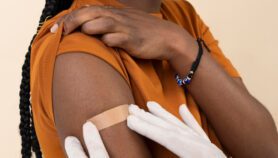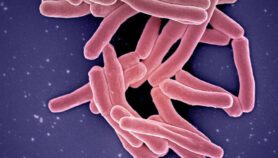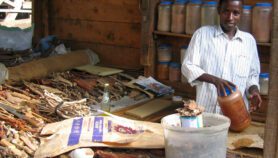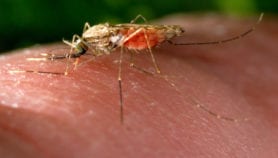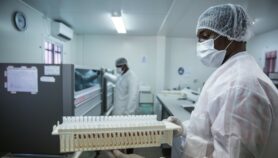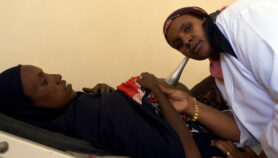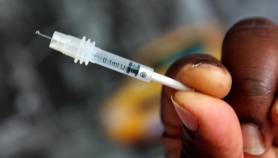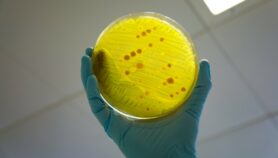08/06/22
COVID-19 vaccine patent deal on a knife-edge
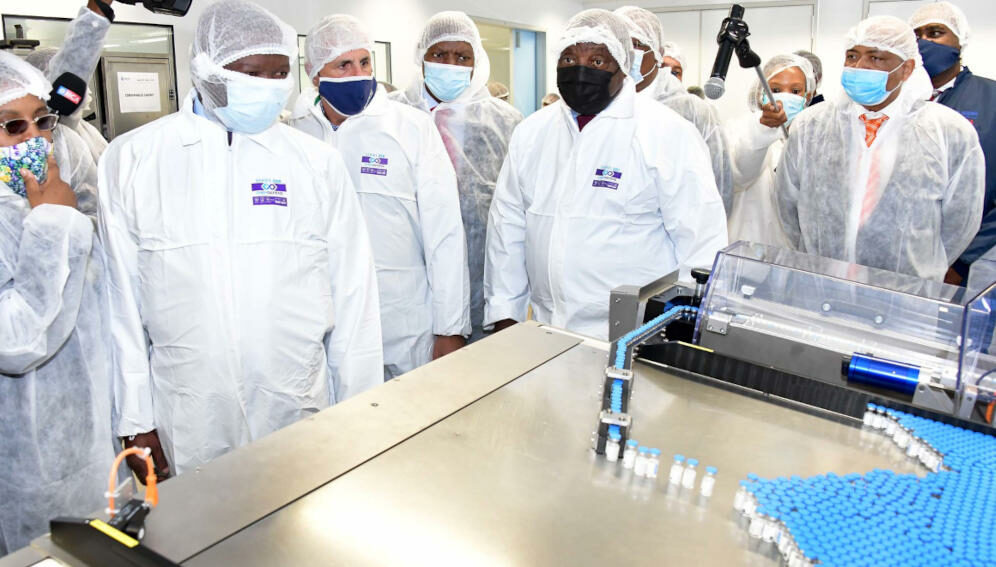
By: Dann Okoth
Send to a friend
The details you provide on this page will not be used to send unsolicited email, and will not be sold to a 3rd party. See privacy policy.
Proposals under discussion at the World Trade Organization (WTO) to temporarily waive intellectual property rights on COVID-19 vaccines are hanging in the balance as vaccine equity campaigners call for the draft document to be torn up.
The Trade-Related Aspects of Intellectual Property Rights (TRIPS) waiver was intended to allow COVID-19 vaccines to be manufactured in developing countries without infringing patents held by big pharmaceutical companies, mostly in the global North.
Only 16 per cent of people in low-income countries have received a single vaccine dose, compared to 80 per cent in high-income countries, according to the World Health Organization.
“Hoarding the rights and recipes to life-saving, pandemic-ending medicine means letting people die and leading to a more divided world.”
Winnie Byanyima, UN under-secretary-general
A waiver was first proposed by India and South Africa in October 2020 and a new draft agreement was circulated in early May this year after negotiations between the two proposers and the European Union (EU) and the United States. The forthcoming WTO ministerial conference in Geneva on 12-15 June was expected to finally broker a deal on the waiver.
But civil society organisations under the umbrella of the People’s Vaccine Alliance have termed the process “flawed” and “untenable”.
“As civil society we disapprove of the WTO text that is being rammed through in undemocratic process where we have been given arbitrary deadlines to arrive at some consensus agreement that’s not really meaningful,” said Fatima Hassan, founder of the South Africa-based Health Justice Initiative, at a virtual briefing organised by the Alliance to comment on the texts of the negotiations last week.
At the centre of the controversy is an EU attempt to introduce amendments to the WTO text that critics see as out of step with the original India-South Africa proposals made at the beginning of the pandemic.
The text focuses on use of the compulsory licensing system, whereby governments can permit the manufacture of vaccines and other medicines without infringement of intellectual property (IP) rights during an emergency such as a pandemic.
The draft text is seen by opponents as too narrow in scope because it covers only vaccines and fails to include treatments, diagnostics or other COVID-19 technologies, the news conference heard.
‘Obscene scenario’
“What we have actually is one of the most obscene scenarios in this pandemic where for 18 months we have been told the waiver would not make significant difference to manufacturing capacity and production or knowledge sharing, but 18 months later—with gross vaccine apartheid and injustice—we have a situation where a handful of countries are trying to limit the waiver to only vaccines,” said Hassan.
There are also concerns that proposed new wording might prevent China and some other partly industrialised countries capable of producing vaccines from exporting to countries that need them.
Switzerland and the United Kingdom were singled out for introducing new wording to the text that seems to “smack of an attempt to further delay any kind of consensus on a vaccine waiver, including further narrowing the flexibilities in the original WTO text,” according to Hassan.
“It’s not a credible text. It should not be agreed to by countries in the global South,” Hassan said.
“We have asked South African and Indian governments not to sign onto this text because it’s a worse deal which will tie our hands for future purposes.”
She challenged countries from the global South to “step up and propose textual amendments to uphold the original proposals made by India and South Africa, which includes waivers for vaccines, therapeutics, diagnostics and medical technologies.
A UK government spokesman said the negotiations were “complex, sensitive and must remain confidential” but added: “We must be clear that the UK is not seeking to delay a consensus and is working with international partners to ensure the best possible outcome, which avoids any unintended legal or policy consequences.”
None of the countries involved have yet endorsed the document which was released by the WTO director-general.
Joseph E. Stiglitz, Nobel laureate and economics professor at Columbia University, US, told the virtual briefing that the current intellectual property framework was “a failure” and called for the draft text to be rejected.
“No-deal is better than a bad deal,” he said. “There’s too much ambiguity in the WTO text, and some of the proposals are a step backwards which do not prepare us for the next pandemic.”
He said that two years into the pandemic and after 20 million deaths, the WTO barriers remained an obstacle to global production as well as access to COVID-19 vaccines medicines and tests.
“There would have been an increase in supply had the IP been waived in line with South Africa and Indian proposals at the beginning of the pandemic,” he added.
“But the pharmaceutical industry has been undermining the process by foot-dragging and by increasing the transaction costs and making it very slow and difficult and that’s why there was such a clamour for a waiver.”
Winnie Byanyima, UN under-secretary-general, executive director of UNAIDS and co-chair of the People’s Vaccine Alliance, said it was disappointing that the WTO had not reached an agreement on a TRIPS waiver. She said South Africa and India, backed by 100 countries, had called for a simple waiver on COVID-19 vaccines treatments and tests, which could have led to their manufacture in developing countries.
“Negotiations have been delayed by a number of rich countries. Millions died but they chose profits over people,” said Byanyima.
Referring to discussions over which countries should be eligible for the waiver, she said: “You have to ask, is the biggest problem we face that too many countries might work together to ensure affordable vaccines, medicines and treatments? Not really. This system is broken. In a pandemic, sharing technology is life or death and we’re choosing death.”
She said rich countries had an opportunity to do the right thing in the coming weeks, adding: “I implore them to put people ahead of profits. Hoarding the rights and recipes to life-saving, pandemic-ending medicine means letting people die and leading to a more divided world.”
George Williams, a frontline health worker and general secretary of the National Health Workers Union of Liberia, said he experienced first hand the consequences of a broken pharmaceutical system when Ebola virus nearly decimated his country, and urged global leaders to work to salvage the TRIPS agreement.
“Even after so many deaths what would it take for a handful of people to save humanity and listen to the over 100 countries calling for TRIPS waiver?”
This piece was produced by SciDev.Net’s Global desk.






